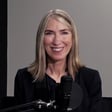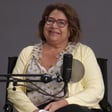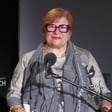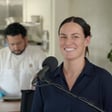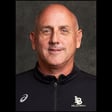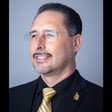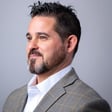Become a Creator today!Start creating today - Share your story with the world!
Start for free
00:00:00
00:00:01

Student focused
Dr. Beth Lesen, VP of Student Affairs and Enrollment Management, discusses how CSULB serves its students.
Transcript
Introduction to 'At the Beach' Podcast
00:00:16
Speaker
Hello, I'm Dan Montoya, Vice President for University Relations and Development. Welcome to another episode of At the Beach. This podcast shares news, personal stories, and ways of listeners can get involved with Cal State Long Beach and is produced by URD.
Focus on Student Affairs and Mental Health
00:00:30
Speaker
Today, I'm so excited to have my colleague, guest, Dr. Beth Lesson, Vice President for Student Affairs, a position she's held since June of 2020.
00:00:41
Speaker
Throughout her career, Beth has focused on some key areas, including but not limited to mental health, disability services, DEI work, and basic needs support for students in financial crisis. Some of Beth's highlights include basic needs programs at previous campuses, Sacramento State,
00:01:00
Speaker
building a fully staffed office of much like cultural affairs with several cultural resource centers, and spearheading the development of a comprehensive mental health strategic plan at the beach which has received national attention. Beth's portfolio encompasses 40 different departments and programs including student health services, counseling and psychological services,
00:01:24
Speaker
Access services for students with disabilities, basic needs, multicultural affairs, and housing and residential life. This is, I mean, we could be here all day reading VP lessons, accomplishments, and so we're we're just so excited to have her. She's also built diverse communities in New York, Ohio, California with expertise in counseling, behavioral interventions, student risk assessment, and again, disability services and learning disabilities.
00:01:53
Speaker
Beth, that's just a thumbnail of the list of accomplishments that you have achieved in your life. And I am so excited to work alongside you and to have you here today. Welcome, Beth. You know, you didn't list my biggest achievement, which was co-chairing the search that got you to this school. That's my biggest achievement. I appreciate that. And yeah, I i am so grateful to be here and it's been an honor to work alongside you.
00:02:22
Speaker
um Today, what I really want people to know is what is Department of Student Services, or Department of Student Affairs, yeah also known at at here at the university.
00:02:36
Speaker
there is so much that falls within your portfolio.
Enrollment Management and Student Support
00:02:40
Speaker
And I don't think people realize the magnitude of it and how it really truly impacts students to achieve success, to find help, to just be a ah voice for them and to advise them so many different ways. So let's just kind of start by talking about your department or your division.
00:03:05
Speaker
And what it does and how it is structured here at the beach. Yeah, happy to. And actually, it's even bigger now since enrollment management moved in. So in addition to all of those student affairs areas, the traditional student affairs areas, yeah now we also do enrollment management. so um So where should I start? Because of enrollment management, we i I work with the folks who um recruit.
00:03:34
Speaker
new students and ah process applications and determine who gets admitted to the institution and who's waitlisted and all of the the many different factors that go into that.
00:03:49
Speaker
And I work with the department that does financial aid packaging and disbursement, and the registrar's office, which keeps all of the students' grades and the cataloging and the um scheduling of classes and putting them in different rooms, really like how the sausage is made. right um And then in the student affairs area,
00:04:11
Speaker
um I like to tell people, because it's so hard for folks to really know what that means, I like to tell people that um we do all the stuff that happens outside of the classroom with students. So um you mentioned a number of the big areas. You mentioned um housing and residence life. And so for lay people, the dorms, that's what most people would say. And we have a ah decent sized uh... residential population about thirty two hundred it folks live on our campus and that's getting bigger soon because we're going to build not one but to more residence halls probably bringing our population closer to about four thousand on campus so we've got a whole thousands of students who live here who don't just go to school here but they live here they sleep here you know they they this is their home
00:05:03
Speaker
um And all of the other support services, you mentioned services to students with disabilities. um There are thousands of students who attend the school. First of all, the school is the biggest it's ever been, um largely thanks to enrollment services. We have 41,300 students on our campus right now, which is an enormous, it's like a town. um Really, it's like a ah small city.
00:05:27
Speaker
can Can you talk a little bit more about the enrollment process? Because I can. It's a production, right? It is a production. It starts in the fall for the following year. Yeah. And then all these applications that are received and we how many do you receive? 120,000 applications. And how many spots do we actually admit?
00:05:52
Speaker
And this year, ah I don't have the exact number, but about 11,000. But that's a mix of first-time, first-year, and transfer students. So usually, it's about an even mix, 50-50. This year, we've got a little bit larger of a first-time freshman, ah first-time, first-year class, about 6,000, and closer to 4,000 transfers. But normally, it hovers. So it's a little more 60-40 this year. But normally, it hovers around 50-50.
00:06:18
Speaker
so So your team has to process 120,000 applications. They do. Isn't that incredible? That is amazing. It is. And so yeah it's it's a big production. And it actually, we refer to um the enrollment cycle as a cycle because we're constantly doing enrollment. yeah And so um every year we,
00:06:41
Speaker
we're in this one phase or another or sometimes multiple phases at the same time. right So we go from recruitment, we we handle recruitment and outreach. So really getting people drumming up interest and telling our story which, you know, STRATCOM, Strategic Communications and URD is a big partner um in that effort, but really getting our story out there and telling people why they would want to come to the beach.
Student Engagement and Community Building
00:07:04
Speaker
And then from there, we get a large um group of invested folks. And then from that group of invested and interested folks, um some of them decide to apply. Actually, many of them decide to apply. 120,000 of them decide to apply. We're one of the most applied to institutions in the country. um And then from that 120,000, unfortunately, we can't take them all. I would love to.
00:07:30
Speaker
ah We send out our admissions letters and some of those folks decide to enroll. Some of those folks who are admitted decide to go someplace else. But most of but many of them are smart enough to come here right to accept an and enroll here. And then we enroll them, then we we get them enrolled. um And then the cycle starts, we have to put them through orientation before they start their classes. And then the whole thing starts all over again. So while we're orienting students over the summer,
00:07:59
Speaker
through orientation, we're also doing outreach to drum up interest for the following cycle. And so it's it's it spins around every year, going in circles. um And that's how we That's how we shape our incoming class. And there's some there's a lot of strategy involved and there's a lot of nuance involved. That's an oversimplified summary. But there's a huge an enormous team of people, a huge team of people who are responsible for doing all of that work. And it's really cool work. like it doesn't I don't make it sound as cool as it really is, but it it's fascinating.
00:08:41
Speaker
um and especially at the volume that we're working at. Yeah, no, I think it's impressive and I've had an opportunity to work with your team. You have you have an amazing staff and it's they they work together, they're very collaborative and they and they kind of have to be.
00:09:01
Speaker
because there's so many components that interact with each other at at all times. So I'm glad you kind of brought up this cycle because orientation happens, people come in, and then they kind of get into the rhythm. There's a lot of things that happen within the first semester, right? There's a yeah lot of, and and there's a lot, not just with freshmen, but everybody else. And so I wanted to, I know that you you have a PhD in counseling and school psychology,
00:09:27
Speaker
And you were a former faculty member at the City of ah you University of New York. How does that play in to what you do? But most importantly, in you understanding those situations as they arise in those first, you know, the first semester of of the first year, but then also the other mental health pieces that have risen over the last couple of years. Yeah, that's a great question, thanks. I i tell people all the time that I think a psychology degree is perfect for this role. um i First of all, first of all i call a psychology degree is really valuable when you're in in any kind of managerial role right at all. But especially when we're talking about students and student needs, excuse me, and the developmental process. And because students come here and they're young adults, so they're still in a very pivotal place in their own development. And so understanding that is crucial because that people are very tempted to treat
00:10:31
Speaker
um the way that they would treat a you know ah group of 40-year-olds or a group of 50-year-olds and and have place on them expectations that are developmentally developmentally inappropriate. And so it's really important to have a solid idea of of student development theory, and which is really rooted in psychology and human development theory. right So you know we we talk a lot in student affairs about how to help people to engage, how to help our students to engage, and how to help them find their home base and their fit. um So for example, some of the things that exist in student affairs.
00:11:12
Speaker
um are specialized programs for specific populations of students, such as um guardian scholars that serve um former foster care, you know people who have aged out of foster care, ah veteran services, which serves students who served in the armed forces or their dependents.
00:11:35
Speaker
um the Dream Success Center, which serves students who are undocumented, black the black resource center Black Student Resource Center, or you I can name a million of these, the ah services to students with disabilities on our campus, it's called BMACC, the Bob Murphy Access Center, named after Bob Murphy, who was so supportive of that work.
00:12:00
Speaker
But all of these centers are speaking to a particular aspect of a student's identity that feels really defining for them and helps them to find other people who share that experience and that aspect of their identity. And by doing that, a school like a school of 41,300 students can feel a lot smaller and more intimate and more homey and welcoming. And when students find those spaces and find their people and find where they belong, they navigate school in more successful ways. They utilize resources when they're struggling more. They're more aware of what's available to them and they leverage those opportunities and they stay here and they're more successful.
00:12:54
Speaker
So every single one of those different areas offers, especially for some populations like Guardian Scholars or like Project Rebound for formerly incarcerated students, these are populations of people who often don't wind up in higher education. right Only 2% of people who've been through the foster care system ever graduate college. So if you're someone who got to this campus, you've already distinguished yourself as highly capable and really special. And it's our job to meet you where you're at and support you so that you can be successful instead of you feeling completely alone and disoriented and maybe leaving because you think that maybe you made a mistake coming to begin with. So a lot of our programs do that. Find students who need extra support.
00:13:48
Speaker
get them together in community and shove as much support under of them as humanly possible to make sure that You know, they entrusted us with their, with their futures and we want to do everything that we can to make sure that their futures are everything that they want them to be. Yeah. That's again, that's amazing. And to do it for so many people, it's wow. It's phenomenal. It's a lot of people. Yeah.
Innovative Mental Health Strategies
00:14:12
Speaker
So, um, tell talk to us a little bit about the comprehensive mental health strategic plan you've created here at the beach and, and, you know, how it's doing and how, you know, what are you looking to continue to grow?
00:14:26
Speaker
Yeah, that's probably one of my favorite subjects to talk about, so thanks. um When I got here, so President Connolly, as you know, is also a psychologist. And when I interviewed for my job, she wanted to know what I was going to do to address the mental health crisis on this campus. And when I say mental health crisis on this campus,
00:14:46
Speaker
I say that in the context of there's a mental health crisis on all college campuses across the country, not on ours specifically, but across across the nation. um And as a psychologist, President Connolly was very aware of it and wanted to know how were we going to pioneer some really strategic interventions. Most campuses have a counseling center and it's full of wonderful counselors who care a lot about students and do a wonderful job. Most of them do one ah one-to-one counseling and when we're lucky they can work in in small groups.
00:15:23
Speaker
and on a campus that has 41,300 students, that can't be the only strategy that we employ. And the counselors can't be burdened with owning the entire responsibility for everyone's mental health and wellbeing. That's unsustainable. And I think on a lot of campuses, that's what has traditionally happened. um And I think there was a time on this campus where that probably is what what happened. um So when I got here,
00:15:50
Speaker
using all of my my background as a psychologist, um we spent the better part of a year really combing through every bit of research on every different kind of best practices that works with this um age group, that works with everything that we know works with historically underserved populations, um college students, men, women, non-binary folks, gender, age, veterans,
00:16:26
Speaker
ah people who are fiscally challenged, people who have experienced homelessness, people who have been through multiple traumas, we pulled so much resource, so much research together. And then we also did a listening tour and made sure that we listened to students who've had different experiences on our campus.
00:16:47
Speaker
and put together a long-term plan for how to approach mental health on this campus how to how to approach fostering and strengthening and supporting mental health on this campus and it goes beyond traditional counseling models first of all because uh... many underserved populations are not really into traditional counseling models. There are lots of communities that, for whatever ah for very justifiable reasons, don't really trust the medical model and aren't very help-seeking, especially with institutions. They're much more inclined to go to their community or their friends or their family or
00:17:32
Speaker
really even a even a religious institution far before they would ever ask anyone on a college campus for help. So a lot of what we embedded in the strategic plan are different strategies to go to the students. Instead of waiting for them to come and ask for help, which is historically how campuses handle these things,
00:17:53
Speaker
our approach is really to go to the students and not wait for them to come to us. Because we know that often they never will, they just won't come. So ah we do that in so many different ways. And while we're while we're going to students and checking on students. And sometimes we do that through text messages. And sometimes we do that by sending mental health professionals into spaces where they already congregate. And sometimes we do that by um using passive programming. There are all sorts of different ways that we embed mental health support into
00:18:35
Speaker
different parts of the campus and while we're doing that we're also working on training more people across campus to have better uh... to have more confidence and to have a stronger skill set around how to help a student who's struggling so that way there's no wrong door a student can walk through any door at the beach and find someone who's ready to help And that's one of the things that we're working on this year. Every year we pick a ah different piece of the strategic plan. It's a working document and we use it every single year. We created it and we don't put it on a shelf and forget that it existed. Every single year we pull some initiatives out of it and get them going while continuing the ones that we did the year before. And so we're doing so, so much. um And this year I'm super excited about launching our um mental health student support.
00:19:28
Speaker
simulations training. wow So i if we get a chance, I'd love to tell you about that. It's it's very it's a very neat thing that we're doing to help um faculty and staff who are not mental health providers build their skill set around really being able to show up in strong and successful ways for students who are having a hard time. Yeah, I think that's so powerful because we i mean we all interact with students in one way, shape or form.
00:20:00
Speaker
And I think it creates a good culture. What you described is so rare because you see that more in a private school to the extent that they will actually reach out to folks and students and check in on them and all that. So kudos to you because at a large institution like ours, that is not heard of.
00:20:18
Speaker
It's very hard. You know, like you said, small privates can do things like that because it's a small it's not a at our scale. yeah But when you hit 41,000, the scale is can feel really overwhelming and prohibitive. So what we're trying to do is give our students a high touch experience, what feels like a small private at a large public. Right. Yeah. And I think you, you have a great base to solving a lot of these challenges that our students face. What other challenges are students facing at this time? And, and I know you're, you've poised or positioned your staff to kind of meet the moment, yeah but what are, what are their challenges and, and how are we, how are you addressing those?
00:21:04
Speaker
It's an extraordinarily hard time and place for students. you know This is a hard time in history for everyone, um but we're in Southern California, and it's just ridiculously expensive to live in Southern California. There isn't one person who will listen to this who doesn't know that in their soul.
Financial Struggles and Basic Needs Support
00:21:23
Speaker
it can be crushingly expensive to live in this area. And so if it's that hard for adults who are already on their career paths, imagine how it is for a student who doesn't yet have a degree to afford going to school. And you know,
00:21:43
Speaker
i just I just came back from a summit on student success through the Chancellor's Office and there were a lot of students speaking and several of them said over and over again, I was like, preach! um Several of them said over and over again, it is not like what it was when you were in school.
00:22:00
Speaker
you remember something that is different from what it is now. So I think there are a lot of folks who think, well, you know, I went to college and yeah, I ate ramen a lot and i it was hard, but I got through it and why can't these these kids do it too? And it's just not the same as it was when when we did it. right um So one of the Things that I think is the hardest for our students, the biggest struggle besides the mental health stuff, and often they interact with each other, is the financial challenge that so many students are are going through. you know Our students, many of them start off financially challenged before they ever get to us. like
00:22:43
Speaker
We have an enormous Pell-eligible population. So a lot of our students receive financial aid because they they have to, because they're eligible, because they they didn't have money before and they don't have money now. um Some of our students have come from situations where you know maybe they had a ah family that they lived with through public school, but maybe that's something that they can't do anymore. So a number of our students, maybe when they come to college, they um recognize a part of their identity that they weren't as fully acquainted with when they were younger and it doesn't work well with their families. So just to get straight to the point, some of our students come out of the closet as gay and their families aren't supportive and they get kicked out of their house and they have nothing. Or you know some of our students wind up in really abusive situations and they have to escape those situations and they wind up with nothing. you know And other students,
00:23:42
Speaker
they Maybe they live with their families, and then their family they maybe they live with a single mom or a single dad, and then that parent gets laid off. And then not only do they have nothing, but their whole family has nothing. We have students who are in jeopardy of being evicted on a regular basis.
00:23:58
Speaker
we have students who Let us know that they're living in their out of their cars. We have students who aren't sure where their next meal is coming from. Thank God we have a food pantry for emergency situations. um So that's that's really where the entire Basic Needs Program came from. And i I created the one at Sacramento State. This one at Long Beach was already here when I got here. But we've extend expanded it significantly, and it's doing really amazing work.
00:24:26
Speaker
You know, they offer student emergency grants for that that can really hold someone over, um can prevent someone from getting evicted, or can help someone to get a new apartment after they've been evicted, because oftentimes they can afford the rent, but they can't afford the security deposit.
00:24:45
Speaker
or you know they had they they lost a job and they've got a new one now but they're missing a couple of paychecks and they just need to get through that one or two months and if we can get them through that one or two months are going to be okay you know or someone who's living out of their car and they need they just need a little bit of help to get housed um And so our our emergency grants or as someone who is housed and is doing fine, but they're barely making ends meet. They're just keeping it together and then their car breaks down.
00:25:20
Speaker
and they have and without their car, they can't go to work, they can't do anything. And if we can just give them what they need to get that car fixed, everything will be okay. But if we don't give them what they need to get their car fixed, their whole lives are gonna fall apart. Yeah, and and and we haven't even touched like the health stuff, right? because Oh my God. There's there's that toothache that comes into play. Let's talk about dental emergencies. There's something else that comes up and you're like,
00:25:46
Speaker
I wasn't planning for that, and i but I got to take care of it. I had a student say to me once, I am one root canal away from homelessness. And I was like i felt that in my stomach. It was like a kick to my gut. I am one root canal away from homelessness.
00:26:04
Speaker
Oh my God, nobody should ever have to decide between living and learning. No one should ever have to make a choice between having a place to live, eating food, and going to school. So we should be able to manage all three in the richest country in the world. So I love how you talk about that because higher education has got a bad rap about the value, right? Oh, totally. But if you think about this, what people don't understand is a college degree is not just in the classroom. No. It's all those other skills that you learn. You know, especially learning how to make ends meet, learning how to be on a budget. You're adulting. You're learning how to be an independent functioning adult. Yeah, finding resources.
00:26:50
Speaker
ah you know being able to go ask for help or or are make your needs known, a lot of that stuff is real world stuff that yeah happens even after you graduate. So I think you know when when i would if I were to go back and and dissect those statements of higher education is not what it used to be, it's not the value. I would argue against that because when somebody goes through a training cycle like this, four or five years, maybe six years,
00:27:19
Speaker
they're better equipped to face the challenges outside of, you know, a university. A hundred percent. Than if they didn't go through it. And learn to navigate the system. The system is overwhelming. Yeah. And it's prohibitive. And I have a PhD. Right. And I have challenges navigating it. Yeah. So, excuse me. So for our students,
00:27:46
Speaker
Learning how to navigate the system can be can make or break everything. I'm gonna go on a rant now if you don't mind. Go for it. I know, if you don't mind. let me tell you a couple Let me tell you some of the things that our students are dealing with that folks who have enjoyed being in the middle class for a long time would never imagine some of our folks dealing with, but they are.
00:28:12
Speaker
We have students who are on Medi-Cal. We have students who are on CalFresh, which is food benefits. We have students who are on CalWorks, which is benefits for people who are have dependents. We have students here on a GI Bill. If there is a government program, we have students here who are on it. And let me give you an idea of how crazy making some of these programs can be for our students. Do you know that if you're on Medi-Cal,
00:28:39
Speaker
And you live in Northern California, like Sacramento. And then you come to Cal State Long Beach. You're in a totally different county and a different part of the state.
00:28:50
Speaker
you are no longer covered by Medi-Cal you have to start over you have to transfer your Medi-Cal from Northern California to Southern California or you don't have health insurance and then if you go back to Sacramento for the summer like so many students do you need to do it ah again so that you have health insurance coverage over the summer, and you need to do it every single time you go back and forth. And it gets that's that would even be easy. If you're a student who has Medi-Cal with your family, with your family instead of independently,
00:29:27
Speaker
your health insurance is tied up with your family. It's a whole other crazy process to extricate yourself from your family so that you're transferring your health insurance instead of your whole family's health insurance. And we expect 18-year-old kids to figure out how to do this. This is why we have case managers on our campus because it's impossible. it's impossible The system is not set up to help people use it. yeah it is There's so much red tape and it's so confusing and it's so hard. And we on on our campus, we work very hard to help our students learn how to use the benefits that they're that are available to them and to their advantage and be able to
00:30:21
Speaker
minimize the difficulty that they have accessing what what is due to them but if you haven't been through it and you don't work with it you just have no idea how complicated it is and how hard it is on on our students and so when those students said to everyone it's not what we're dealing with now is not what you dealt with then i felt it in my soul when they said that because it really is true and i think if everybody understood how much our students balanced
00:30:55
Speaker
and still came to school, it's still coming to school and getting good grades, I can't imagine who wouldn't want to hire our students.
Addressing Mental Health Crisis and Inclusion
00:31:04
Speaker
Because if they can get good grades while they're figuring out how to transfer their Medi-Cal and working you know and doing an internship and getting in good grades, there's nothing that they're not capable of doing. They're superhuman. Yeah, and at the same time, all the information that's coming at them all the time. A hundred percent. And then we wonder why we have a mental health crisis on college campuses. Like how much can you possibly put on their shoulders before they feel a little too stressed to manage so so well every day. Yeah. And like I said, you know, the you know, this university is like a small city. It's enormous. And it has so many different variables at any given time. Yeah. And we have people who live here and we have people who, you know,
00:31:52
Speaker
We have everything. We run a full service student health and wellness center with doctors and nurses and physician's assistants and we even have an x-ray machine. ah We have a medical center that that we run in student affairs. Like a pharmacy too? Yeah, a pharmacy. We've got a counseling center with licensed psychologists and social workers. We've got case managers. We've got a police department on our campus. It is a basically, it's it's a city. Yeah. So let's jump in real quick on a equity and inclusion as a big part of what you do here. yeah Talk to us a little bit about that because you you you gave us a good picture of
00:32:34
Speaker
your division so some of the big issues that you guys are working with and then you know the challenges that you guys have throughout you know our whole city here um but how do how do people feel inclusive and and equitable or or valued here while they're members or citizens of this city yeah you know that's also a process and i'll be honest i think we've made some tremendous strides and i think we also have a ah lot of work still to do i'm but our eyes on the ball and we've been we have done a lot and we will continue to do a lot more uh... i think that we it starts
00:33:14
Speaker
Really, it starts from outreach. It starts from all the decisions around where we decide to put outreach folks and who we decide to reach out to. We're very intentional about making sure that we are reaching out to communities that need to be better served on our campus and making sure that we're increasing um numbers of underserved students, for example,
00:33:44
Speaker
This year, our enrollment of black students, our first year enrollment of black students increased by 20%, which is huge. It's the biggest increase we've seen in over a decade. And the reason that it's increased by 20% this year is because we spent years investing in connecting with our local black community. It's because we spent time, energy, and money on creating a black resource center with staffing to actually support students. It's because we've been in the public middle schools and high schools actively recruiting and telling students, we want you at Cal State Long Beach. So our DEI journey starts with outreach. It starts with being very intentional about reaching out to communities that have not yet been
00:34:38
Speaker
appropriately represented on our campus and rectifying that in partnership with our local community and then we move through you know how do we do admissions when you think about admissions if you really know what it's about there are lots of different ways to decide who to admit to the institution so we spend a lot of time thinking through our admissions policy and making sure that it is uh... that we're not putting up barriers to admission for different communities of color or underserved populations, making sure that our admissions policy is equitable and that the work that the way that we implement admissions is um rooted in really in the values that undergird our institution because these institutions were not built.
00:35:28
Speaker
for under for communities of color. with They were not built for women. They were not built for people who are in religious minorities. They were built for a very small, select group of people, and there were a lot of things put in place to make sure that everyone all stayed out so brick by brick we've had to tear that down and forge a different path so that we've created we create and maintain and strengthen and build on the diversity of our institution and then once we get people here we have to welcome them and welcoming folks is a process you know it's a process it's
00:36:07
Speaker
And I actually generally try to stay away from the word welcome because welcome suggests that it's my house and you're a guest and you should feel welcome. That's a good point. Yeah, I actually try to say make sure that people know that this is their home, that they belong here, that this is as much theirs as it is anybody else's, that them being here is important.
00:36:27
Speaker
We're better because they're here. We need them. Their voice is critical to what we do. it is And therefore, they are responsible for using their voice and participating and engaging and being a part of the community. It's not my house and you come in and like, welcome, take off your shoes, here's dinner. No, no, it's our house. So come on and help make dinner because we are we all live here together. And we do that starting in orientation. with even before orientation. So we're right now we're in the process of reviewing all of our admissions letters and making sure that they are um culturally appropriate. ah Just this past year was the first time that along with admissions students got letters from
00:37:15
Speaker
um a center that is connected to some aspect of their identity. So students got welcome letters from ah the Black Resource Center or the Latina Resource Center or the AAPI, APID Resource Center. They got You know, they got recruited and welcomed and um encouraged to apply by Guardian Scholars or Project Rebound or um the Bob Murphy Access Center because from the moment that someone is accepted into the institution, we want to show them, hey, there are lots of other people who share some of your lived experiences. They're happy. They're psyched to be here. You'll be happy and psyched to be here too.
00:37:58
Speaker
Come on, here are some ways that we're going to support you. Let's get you on board as quickly as possible. They have that through the orientation experience. We're working a lot more with parents than we used to. When I first got here, we didn't do very much with parents. We're doing a lot more with parents because that's so important.
00:38:17
Speaker
for some of our communities like that are super family oriented and also some of those parents are really nervous about sending their kids to school. What does that mean for our family? Are they going to drift apart? Are they going to, you know,
00:38:34
Speaker
Disconnect from our family values and we want to partner with those parents and families and say no, we don't want your kids to separate from those values. We want to incorporate and bring those values into what we do here. So we're doing a lot more work with parents and families than we used to do.
00:38:52
Speaker
um you know we're we're really trying to take down every barrier we possibly can especially around billing like there are lots of times when students might might lose their classes if they miss a billing deadline. We've changed a lot of that. We've moved deadlines back as far as we possibly can. We've lowered the the minimum payment that we can accept. And I think we're going to push harder yeah on those things because I never want to see people struggle because they don't have
00:39:30
Speaker
access to enough money quickly enough. or So these are all the different ways that we work to be more inclusive and more equitable and draw people in and really make them a part of the community but an engaged and um contributing member of the community. I almost got an amen coming from me because good this is exactly what we want people to know because they don't know this and they don't know the behind the scenes ah work that you guys do and this is great this is exactly what I want to do. You know it's a lot of work but also I think what happens is that there's it's such a big place that a lot of people don't know what's going on
00:40:15
Speaker
And or, there's always going to be some folks who aren't happy with what's going on and sometimes those folks can get real loud. And so when when that happens, you know, folks will hear a rumor or they'll see a thing and they have no idea what's true and what's not true. So we we're there are a lot of people in the division of student affairs most of those people were themselves underrepresented underserved college students who you know i'm a first-generation college student myself from a working-class family i struggled to make ends meet no one in my family have been to school before me most of my division are
00:41:00
Speaker
You know, it's a very diverse group of people and they've had this lived experience. And so they, they breathe it like it's in their heart and they look for every opportunity to make it better. So all you have to do is talk to one of them, you know, and when you talk to one, to someone in student affairs, you feel it. Yeah. You can feel it immediately. It's not a job for them. It's a purpose.
00:41:28
Speaker
is is an extension of who they are yes and so that's awesome uh... so In addition to all that, yes ah you do some fundraising. We do. Because there is such a great need and there's so many programs. I got to give a shout out to Dr. David Roman who is he's incredible one of your fundraisers who who actually works in collaboration with a lot of the areas in Student Affairs. Talk to us a little bit about how how can people support, what are some of the
00:41:59
Speaker
programs that you're proud of in terms of funding.
Fundraising and Program Diversity
00:42:04
Speaker
And what are some other areas that you would like to invite people to be our partners or investors? There are so many opportunities. um That's one of the reasons that Student Affairs is so fun. I think that there are lots of opportunities at a university, but in a college, you pretty much know what you're going to get. You know, if you're looking at an academic discipline, you know what you're you know what you're looking at.
00:42:27
Speaker
with student affairs there's so much variety there's really something for everyone so what what i like to know from people who are interested in and helping out is what are you passionate about because if there's something you're passionate about i guarantee you there's a place in student affairs for that to fit yeah so some of the things that we've had people working with us on in the past we've had such generous partnerships uh... we've had people who have um like like Bob Murphy. I can say his name because the entire center is named after him. Bob Murphy, may he rest in peace, really ah understood in a very authentic way the importance of supporting students with disabilities.
00:43:12
Speaker
and about um and talk about equity, about leveling the playing field for folks who um we're dealing with specific who would deal with specific challenges on a daily basis. And he ah funded a lot of the work that we do out of BMACC, out of the Bob Murphy Access Center, and and we continue to enjoy the benefits of his investment.
00:43:35
Speaker
We've had folks who have donated, who have partnered with us around um Project Rebound, around supporting ah form formerly incarcerated students. What a project, man. Like when you think about, there is no other s thing in the world that prevents recidivism the way education does. So when, I mean, it's it's empirical fact. So what you want when someone
00:44:09
Speaker
is is able to come out of the carceral system, you want them in school. We all want them in school, and they want to be in school. So supporting someone who was formerly incarcerated to get an education is an amazing, it's an amazing opportunity. Or we look at um our text program, our our text, so we we had a partner who helped us to um purchase a platform that we use to reach out. Earlier I talked about not waiting for students to come to us when they need help but going to them. So multiple times a semester we reach out to students by text live peer
00:44:50
Speaker
you know, peer helpers, reach out to our students by text to do check-ins. How are you doing? What's going on? Is there anything that can help that we can help you with? And sometimes students respond and say, I'm good, no worries. But sometimes students respond and say, I'm falling apart and I need help. Or my father just died and I have no idea what to do. Or, or you know, I don't know who my advisor is. And so,
00:45:18
Speaker
by us going to students were able to catch problems while they're still small although some of the ones that i just listed are not small but we're able to catch them and provide support instead of waiting to see if they ever come to us to ask for support. And so in this way, I'd like to think that we prevent small problems from getting large, or we catch big problems that we might not have had an opportunity to catch. And the reason that we're able to do that is because we had a partner who was prepared to um to to fund the platform that empowered us to do the program. so
00:46:00
Speaker
There are lots of different ways some people are really into AI. Like if you're if you're someone who wants to help people and you're really into AI, let's talk. I'm really into AI. There's a lot of ways we can use generative AI to help students.
00:46:14
Speaker
And so it really is about what people are most excited about. And so some of the opportunities that I'm excited about that is this mental health support solutions platform, we built our very own online virtual training for that is available to every single person on this campus. And it's around helping people learn how to help a struggling student. And instead of just teaching you things, it actually runs you through a simulate through simulations as though so that you can practice talking to a student.
00:46:48
Speaker
um It's online. It doesn't take long. It's gamified. You get points depending on what you how good your answers are. um You can start and stop at any time you want. You can take it anytime you want. You can take it from anywhere you want. And it's available in English and Spanish. So we're we've opened it. Custodians are taking it.
00:47:07
Speaker
ah receptionists are taking it, faculty, staff, cafeteria employees are taking it because you have no idea who can help us. Anyone can help a student is the idea. I would love a partner to work with us on that project. There are so many things.
00:47:28
Speaker
We've had some really generous partners who have been very excited about supporting former foster students who have been through the foster care system. That's a wonderful program. so few So few people who have been through the foster care system graduate college and we have doubled our student population in that area in the past few years. It's amazing. So being able to pull more people from the foster care system into college. Come on, tell me how that's not God's work. Yeah, it it is. And we've talked about it in in previous podcasts. It's like the amount it costs to educate a student versus having them incarcerated is... It's a no-brainer. Yeah, and and you create productive citizens that will change generations. And there's and they're really talented, they're so psyched. yeah And also, the the if you're a military veteran like you are, yeah Dan Montoya,
00:48:21
Speaker
support support our student veterans. like What would be a better use of your your time and treasure than to support student veterans? So really the fun part about student affairs is that whatever you're excited about, we've got that. Awesome. Let's finish off on commencement.
Celebrating Student Achievements at Commencement
00:48:39
Speaker
Commencement. Because that's like the finish line. The hot topic. that's our Or it's the finish line for a lot of students, and it's also almost the ah finish line for the cycle.
00:48:50
Speaker
Of the academic calendar, right? Yeah, then and then and then yes What makes you excited about commencement? Oh god the pride I tell people there are two The two times of year that I love the most are orientation and commencement right Orientation because people are so excited. They just got here and they're just like buzzing. They can't wait to get started. They're wide-eyed. The world is their oyster. Like, that's so awesome. And then commencement because the pride. The students are so proud of themselves with the families. That's what makes me cry. I have never been to a commence commencement that hasn't made me cry at least one time.
00:49:32
Speaker
because I look out into the sea of families that are there to see their students. I never cry over the students the graduates themselves. I cry when I see someone's mom cry, or when I see a spouse cry, or when someone holds up a child of one of our students and they're blowing kisses. Oh my god, I could cry just talking about it right now. Or when Abuela.
00:50:01
Speaker
you know, sits there and like pats her chest because she's choked up, levels me every single time. Well, again, that's like the, that's the culmination of all the worries, all the learning experiences, all the frustration, all the lessons learned, all the failures and triumphs and everything comes down to that moment to say, yeah I did it. The resilience is remarkable. It's that moment where a student knows because it's i I get called on to make a lot of the speeches at the cultural grad ceremonies. And what I tell them over and over again is that I hope in this moment, as you're telling yourself, I did it, I hope the next sentence is, and that means I can do anything.
00:50:53
Speaker
You did this so you can do anything. And I think that's really the first moment where some of these students realize I can do anything. And how powerful is that?
00:51:11
Speaker
Beth, what an honor and a privilege to speak to you. Thank you so much. That concludes another edition of At the Beach. I'm your host, Dan Montoya, Vice President for University Relations and Development, which produces this podcast. Thank you for listening. As always, we like to close with a Go Beach on three. One, two, three. Go Beach!
